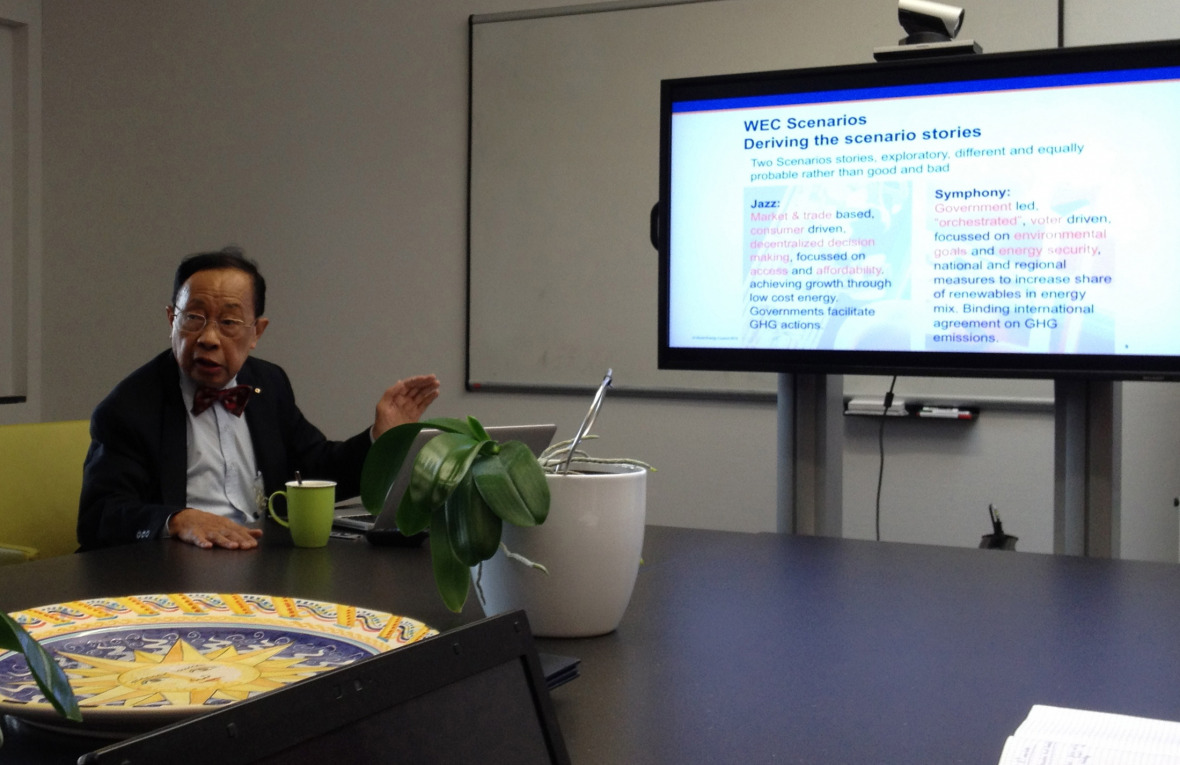Headline:
Different Routes to the Energy Transition: IASS Senior Fellow Ching Chuen Chan Analyses Global Energy Scenarios

Long-term scenarios are an important part of the debate around the energy transition and are often seen as a useful tool for planning and decision-making. At the same time, they are sometimes unable to take account of all the complexities and far-reaching implications of the issue. In order to discuss some recent attempts at predicting the future energy system, IASS Senior Fellow Ching Chuen Chan gave a presentation on “Global Energy Scenarios and Innovation”.
His starting point was an analysis of the World Energy Council’s 2050 scenarios, which are divided into a market-led, consumer-driven ‘Jazz’ scenario and a government-led, voter-driven ‘Symphony’ scenario. Both are meant to represent equally probable routes to the future energy system, but each implies different policies and economic strategies that would lead to significant variations in terms of the energy mix, costs, technologies and greenhouse gas emissions.

More fundamentally, they entail different trade-offs between the sometimes conflicting goals of the ‘energy trilemma’: energy security, energy equity, and environmental sustainability. For instance, the ‘Jazz’ scenario is expected to result in lower energy costs and a greater increase in worldwide access to electricity, but the use of fossil fuels would also be higher. The ‘Symphony’ pathway, on the other hand, would lead to greater reductions in greenhouse gas emissions due notably to additional investment in renewable energy sources. However, it would be more expensive than the ‘Jazz’ scenario and less successful in the field of energy equity.
In the discussion that followed Chan’s presentation, however, some of the assumptions underlying each scenario were challenged. In particular, it was noted that renewables allow for more decentralized energy generation – as opposed to fossil-burning power plants – and can therefore improve access to electricity for many communities through small, local installations that do not need to be connected to a central grid. Furthermore, it is very difficult to establish the costs of either scenario with any certainty: while some direct costs like investment in or subsidies for renewables or carbon tax increases can be quantified, the comparative costs of failing to mitigate global warming can not. More generally, the participants agreed that real-life policy choices and transformation strategies are likely to be more diverse. For example, it was pointed out that Germany’s Energiewende has elements of both scenarios. In this respect, IASS Executive Director Klaus Töpfer, remarked that “the manifold interdependencies and the different development paths demonstrate that is necessary to include a wide range of opinions and practical experiences when using scenarios.”
Another factor that can make our predictions about the future energy system uncertain is innovation, particularly technological innovation. Professor Chan has worked for many years on improving the technology used in electric vehicles, while also advising industry and governments on the economic and infrastructure changes that would facilitate their use. He knows how hard it is to win over the audiences that matter to new ideas that compete with established methods. In his view, having “an open mind and courage” is most important thing when it comes to innovation. The last part of the seminar explored the different steps an innovation goes through before becoming reality, from the original inspiration to implementation. At the core of this process lies the question of how information is generated, distributed and exchanged in an open society. Professor Chan emphasised that “information should be distributed and shared as widely as desired”, with a focus on the qualitative aspects of information rather than its quantity, and for the purpose of “creating new business models and opportunities for innovation that are integrated more effectively with the needs of the local and global society.” At the IASS, energy transition is a crosscutting theme that is tackled with a transdisciplinary approach. Many projects, including our research on innovative solar power systems, involve stakeholders in research activities early on to enable a two-way exchange of knowledge that can help us to better match research to societal demands.
Presentation:
Ching Chuen Chan: Global Energy Scenarios and Innovation
Photos: start page (c) istock; inline image: (c) IASS
